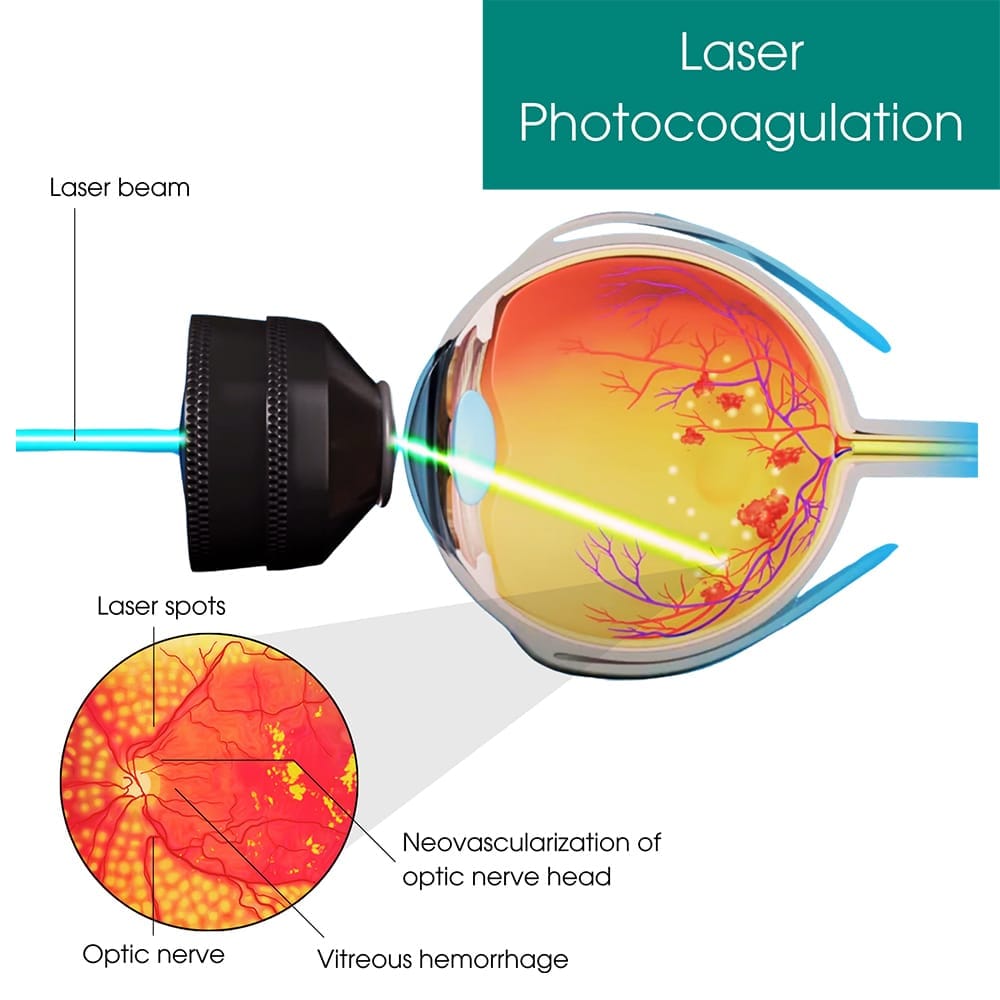 Laser photocoagulation is a specialized medical procedure that uses concentrated light to treat several eye diseases. This method uses the precise energy of a laser beam to target specific parts of the eye, providing a therapeutic strategy to manage conditions. It focuses on shrinking or eliminating abnormal blood vessels in the retina. The laser generates powerful light that’s precisely aimed into the retina or other damaged tissues, generating heat.
Laser photocoagulation is a specialized medical procedure that uses concentrated light to treat several eye diseases. This method uses the precise energy of a laser beam to target specific parts of the eye, providing a therapeutic strategy to manage conditions. It focuses on shrinking or eliminating abnormal blood vessels in the retina. The laser generates powerful light that’s precisely aimed into the retina or other damaged tissues, generating heat.
Typically conducted as an outpatient procedure, retina photocoagulation provides you with a safe and effective treatment option when performed by experienced ophthalmologists and optometrists.
Laser coagulation works well for a variety of disorders, including:
Eye Physicians is a New York City-based practice in Downtown Manhattan with skilled eye doctors who specialize in comprehensive eye care, providing accurate and successful laser photocoagulation procedures and a wealth of other services.
Including:
Laser photocoagulation is an important tool for protecting and recovering vision by sealing leaky blood vessels, lowering swelling and healing retinal injuries.
It can effectively treat several eye conditions, such as:
Determining whether retina photocoagulation is the best option for you requires a thorough examination of your particular eye health, medical history and treatment goals. Laser photocoagulation may be advised to slow disease progression and save your vision.
The level of damage, the precise position of abnormalities and your overall health will all be assessed to ensure that retinal photocoagulation is the most effective and acceptable treatment option for you. If it’s deemed necessary to treat a child, Eye Physicians has the most experienced pediatric eye doctors available to effectively work with kids.
Laser photocoagulation treatment is painless since it’s conducted under a local anesthetic, which numbs the eye and surrounding area. And if you need it, your eye doctor can give you something to relax you as well.
Steps in the procedure include:
After the retinal photocoagulation is completed, you may feel a slight discomfort or blurred vision, which usually disappears within a few hours. It’s important to follow any post-procedure advice given by your doctor, which may include using prescription eye drops and avoiding intense activity for a short time.
In certain situations, multiple sessions of photocoagulation may be required to get the desired treatment effect. The procedure can be repeated as needed, with little additional risk. Soon after the initial procedure, your eye doctor can tell you how many sessions your eyes may need, how long you should wait between sessions and what kind of results you can expect.
You vision will be blurry for the first 24 hours. You may see floaters, but these will subside over time. Your retina surgeon will talk to you throughout the procedure to ensure you remain as comfortable as possible. If extensive laser treatment is necessary, an outpatient procedure with mild sedation at a surgery center may be recommended.
You will need to arrange for someone to drive you home after your retinal laser photocoagulation procedure as your eyes will remain dilated, and your vision may be blurry. You may experience mild pain in the treated eye for a day or two, and your doctor may advise a brief period of limited activity before resuming your normal activities.
While laser photocoagulation is usually regarded as safe and successful, its effectiveness is determined by several factors, including the severity and extent of the problem being treated, as well as your doctor’s level of experience. It’s most effective for early-stage vision loss. It can’t, however, restore lost vision. Yet it significantly lowers the chance of permanent vision loss.
Photocoagulation’s non-invasive nature significantly minimizes infection risk by allowing direct eye access. It uses an externally focused laser to target retinal abnormalities without breaking the eye’s protective layers. As a result, post-procedure monitoring and antibiotic needs are reduced, easing your recovery. This approach shortens the healing period and reduces the chance of significant effects, increasing patient satisfaction.
Other benefits include:
Since each pulse of the laser causes a microscopic burn in the retina, you may develop:
If not treated, diabetic retinopathy can cause permanent blindness.
Eye problems can be difficult to manage, but that doesn’t mean you should let them get in the way of all the visual activities your enjoy. Timely management of these problems improves your long-term eye health. Contact Eye Physicians in NYC today to set up an appointment for a consultation to see if you might benefit from retinal photocoagulation or any other vision treatments or tests available.
Eye Physicians
110 Lafayette St, Suite 503
New York, NY 10013
(212) 292-4814
Entrust the care of your precious eyesight to highly skilled and experienced eye care professionals. For top-notch ophthalmologists and optometrists in Downtown Manhattan, choose Eye Physicians. Eye Physicians ensures prompt care, precise diagnosis, and personalized treatment plans.
Schedule an Appointment